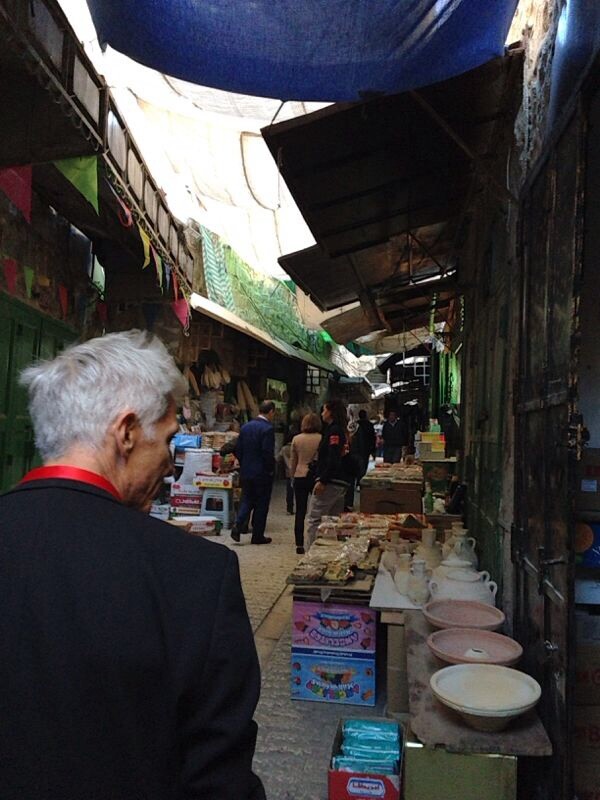11 October 2013

Italian culture minister Massimo Bray in Hebron. (Source)
Italy’s minister of culture has come under strong criticism from Palestinians for visiting an Israeli settlement in the heart of the occupied West Bank city of Hebron on 8 October.
But the minister, Massimo Bray, of the center-left Democratic Party, subsequently expressed some criticism of the settlers, even while cementing Italy’s ties with Israel.
Youth Against Settlements (YAS), a Palestinian advocacy group, accused Bray of showing “solidarity with fanatic Israeli settlers” and of violating international law.
Settlers in Hebron are particularly notorious for their aggression, racism and theft of Palestinian homes.
“Bray’s visit to the settlers stands in clear contradiction with EU regulations and declared policy to stop any support and/or cooperation with the Israeli settlements in the West Bank,” YAS added.
“Bray is now seen as a partner in the occupation and oppression regime of the Israeli government and settler movement, which carries out human rights violations in Hebron on a daily basis,” YAS coordinator Issa Amro said.
Criticism of settlers
Bray’s own account suggests that the visit to the settlers – even if inappropriate – may have been impromptu.
Writing in Italian on his website, Bray’s account of his time in Hebron says:
Together with the Palestinian police we passed through the Arab part, explored the market that is covered with metal netting to protect from the stones and garbage thrown from the windows of the settlers.
Then, alone, I visited the closed section inhabited by the Jewish settlers. Here everything is impressive: the emptiness, the silence; and when the spokesperson of the settlers, an American from Brooklyn, invited me to visit their small museum and the school attached to it, I remained impressed by the children protected behind the railings.
“We need security,” he said to me. And I wonder what purpose it serves to occupy a territory, injure a city, divide a community, and to have more than 1,000 armed men to protect 400 settlers, if it requires living in these conditions.
City divided by occupation
Hebron is a Palestinian city in the occupied West Bank with a population of more than 160,000.
Under a 1997 agreement between Israel and the Palestinian Authority, Hebron was partitioned into two zones: “H1” and “H2.”
H1 is nominally administered by the Palestinian Authority and is home to more than 120,000 Palestinians.
H2, under full Israeli military rule, includes Hebron’s historic Old City as well as the Ibrahimi Mosque in which the American settler Baruch Goldstein massacred 29 Palestinian men and boys in February 1994.
Israeli occupation forces severely restrict the movement of more than 30,000 Palestinians in H2 while Israeli settlers move about freely under army protection.
Ghost town
Settlers have aggressively seized Palestinian properties in the Old City, leaving much of the city center a ghost town.
A 2006 survey by the Israeli rights group B’Tselem found that at least 1,014 Palestinian homes in the Old City of Hebron had been vacated by their occupants and more than 1,800 businesses had shuttered due to the Israeli takeover.
This represented 42 percent of the housing units in the district and more than three-quarters of the businesses.
Palestinians in the city face frequent violent attacks from soldiers and settlers.
Closer ties with Israel
Bray also visited the Church of the Nativity in the occupied West Bank City of Bethlehem and met, in Jerusalem, with Israeli culture minister Limor Livnat.
Bray wrote that he discussed ways to increase cultural cooperation between Italy and Israel.
Livnat’s Likud party is currently campaigning to eliminate the non-Jewish cultural heritage of historically Palestinian cities such as Jaffa.
Update, 12 October : Italy explains minister’s visit
The Consulate of Italy in occupied Jerusalem issued a statement condemning as “specious” claims that minister of culture and tourism Massimo Bray’s visit to the Hebron settlers was an act of “solidarity.”
“During his visit to the Old City of Hebron, Minister Bray has sorrowfully seen the consequences of occupation in order to give testimony about them,” a consular statement said. The encounter with the settlers was “absolutely unintended.”
“Italy confirms its position, in line with the European Union, according to which settlements remain illegal under international law and reiterates that it will not recognize any changes to the pre-1967 borders including with regard to Jerusalem, other than those agreed by the parties,” the statement added.





Comments
political terminology
Permalink Mohammed Hammash replied on
Dear Madame, Sir,
I would like to express my deepest gratitude to Electronic Intifada team and the great job that you are doing.....
one small note concerning the use of the terminology Israeli settlement, cant you use Israeli colony instead of settlement ??
with kind regards
Mohammad